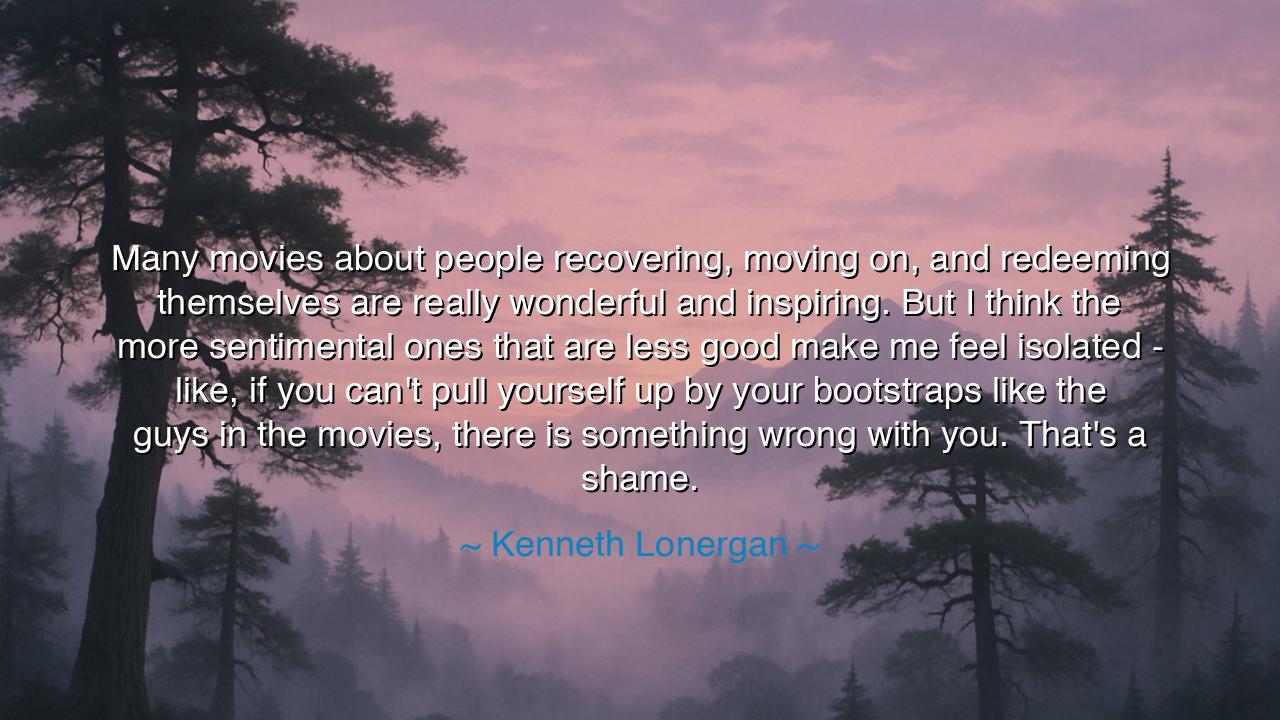
Many movies about people recovering, moving on, and redeeming
Many movies about people recovering, moving on, and redeeming themselves are really wonderful and inspiring. But I think the more sentimental ones that are less good make me feel isolated - like, if you can't pull yourself up by your bootstraps like the guys in the movies, there is something wrong with you. That's a shame.






Hear the voice of the dramatist, Kenneth Lonergan, who spoke with the clarity of one who has gazed deeply into the soul of sorrow: “Many movies about people recovering, moving on, and redeeming themselves are really wonderful and inspiring. But I think the more sentimental ones that are less good make me feel isolated—like, if you can't pull yourself up by your bootstraps like the guys in the movies, there is something wrong with you. That's a shame.” These words pierce with honesty, for they reveal a truth that art sometimes forgets: that human suffering is not always healed swiftly, nor is redemption always simple or triumphant.
The meaning is this: stories of recovery, moving on, and redemption can stir hope, but when they are painted too easily, they can wound instead of heal. For life’s true sorrows are heavy, and not every soul can rise quickly from grief or failure. When art suggests that all one must do is “pull up by the bootstraps,” it risks condemning the brokenhearted, making them feel unworthy for not being able to climb out of the pit so easily. Lonergan calls this not merely false, but a shame, for it isolates those who most need compassion.
The ancients knew this truth well. In the tragedies of Sophocles, such as the tale of Oedipus, the hero does not find swift recovery or easy redemption. His suffering is deep, and his path forward is long and bitter. The Greeks knew that sorrow is not quickly banished—it lingers, it shapes, it teaches. Their art did not isolate the grieving by offering shallow consolation; rather, it honored suffering as something profound and universal. Lonergan, too, urges us to reject the sentimental in favor of the honest, for only honesty can truly comfort.
History provides a mirror in the life of Abraham Lincoln. Throughout his years, he carried the heavy weight of melancholy. He did not simply “move on” from loss or depression as though it were nothing. Instead, he bore it, wrestled with it, and through that struggle gained a depth of compassion and wisdom that allowed him to guide a fractured nation. If Lincoln had lived in the shadow of sentimental tales, he might have been judged weak for not casting aside his grief. Yet it was his very endurance of sorrow, slow and difficult, that became his greatest strength.
Lonergan’s words remind us of a deeper truth: every soul moves at its own pace, and suffering is not a flaw. To grieve long, to stumble often, to find recovery only slowly—these are not signs of failure, but of humanity. When the world demands swift redemption, it betrays the dignity of those whose wounds run deep. True inspiration comes not from easy victories, but from the quiet courage of those who, even without triumph, continue to breathe, to endure, to live another day.
The lesson for us is clear: beware the temptation to judge yourself by the sentimental stories of others. Do not measure your healing against the illusions of art or the triumphs of another’s tale. Instead, honor your journey, however slow, however imperfect. Redemption does not always come with music and applause. Sometimes it comes in silence, in patience, in the smallest steps forward that no one else may see. And that, too, is worthy.
Practical actions must follow. When you suffer, give yourself the grace of time. Do not force your soul into the shape of another’s story. When you encounter those in pain, resist the urge to offer shallow encouragement—“move on,” “cheer up,” “be strong.” Instead, offer presence, patience, and understanding. Create space for truth, not sentiment, for it is truth that heals. And when you tell your own story, tell it honestly, so that others may see that struggle is not shameful, and that slow healing is still healing.
For remember this: suffering is not weakness, and slow redemption is not failure. The tales that dismiss this truth leave the hurting more alone. But the art, the stories, the words that embrace it—these bind us together. Let us, then, honor Lonergan’s wisdom: to reject shallow sentiment, to embrace the depth of sorrow, and to remember that even in long, unfinished journeys, there is dignity, strength, and hope.






AAdministratorAdministrator
Welcome, honored guests. Please leave a comment, we will respond soon